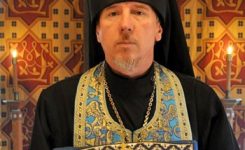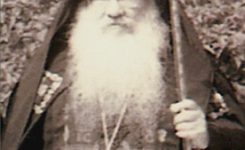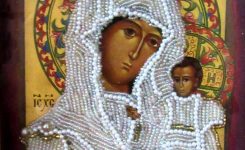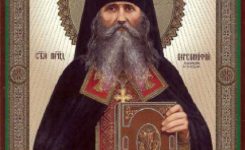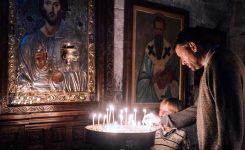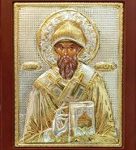monastery musings
Saint Spyridon is quick to hear
Saint Spyridon is quick to hear
A Story from The Optina Garden
The Optina Garden is a beautiful book written by Nina Pavlova, a spiritual daughter of Archimandrite Adrian (Kirsanov). Nina also authored Red Pascha, the account of the three Optina monks murdered by satanists in 1993.
Nina was so captivated with Optina that she purchased a house near the outskirts of the Monastery. Daily she visited with the Elders and monks, which provided her with a privileged connection to the Elders. She kept detailed and valuable notes on events, characters, and dreams. Due to the assistance she provided the Monastery, she was trusted by the elders and with the spiritual guidance they provided her, she received a serious theological education.
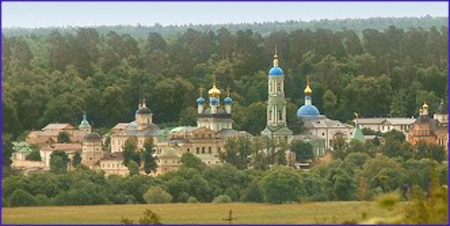
Optina Monastery today
www.media.pravoslavie.ru
Written in Russian, the text was translated into Greek by Father George Konispoliatis. Gerontissa Theonymphe of the Παναγιοπουλα Μετοχι (Panagiopoula Μετochi) in Corfu, Greece, found particularly interesting an excerpt from one of the stories “It would be good to pray to Saint Spyridon Tremithus”, and translated it into English for the Queen of All Skete.
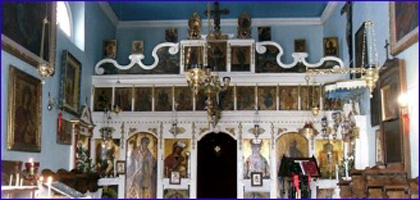
Panagiopoula Μετochi in Corfu
http://www.corfu-odigitria.com/index-gr.html
Our gracious thanks to Gerontissa Theonymphe for making this lovely story from The Optina Garden available to English speakers.
The Optina Garden
by Nina Pavlova, the day of Archangel Michael
The following is an excerpt from one of the stories:
It would be good to pray to Saint Spyridon Tremithus
There are many saints whom we befriend. Saint Spyridon however was the first who opened the gates to God’s mercy, and from that mercy and from your personal experience you understand that God doesn’t give you sorrow more than you can bear, but that everything happens for your good. I loved Saint Spyridon so much that every day I read his hymn:
O God-bearing Father Spyridon, thou didst prove to be a champion and
wonderworker of the First Council. Thou didst speak to the girl in the grave,
and didst turn the serpent into gold. And while chanting thy prayers, O most
sacred one, angels didst minister with thee. Glory to Him who hath glorified
thee! Glory to Him who hath crowned thee! Glory to Him who worketh
healings for all through thee!
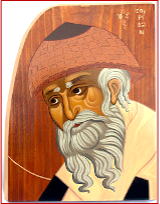
Saint Spyridon
http://saint-spiridon.blogspot.com
I remember one summer when the family Voropayief with their children came to Optina but they could not find a house to rent. They came to my house, all of them so sad, telling me that no one would rent to them because of the children, so now they would have to leave.
“Let’s read the hymn of Saint Spyridon” I suggested.
I began to read, while the children watched me in amazement not being able to understand the words of the hymn. I started to tell them the Life of the Saint since the hymn briefly describes scenes from his life. Every line is yet another miracle. The children really liked the transformation of the snake to gold. That happened during a period of famine. It was then that a poor man approached Saint Spyridon, and though crying recounted how he asked a rich man to give him bread and seed which the rich man refused to do without a pledge from the poor man. Just then a snake slithered through the field and the Bishop, without the sobbing man seeing this, scooped it up onto his staff and turned the snake into a gold ornament. He then gave this to the poor man advising him to give it as a pledge and only to return it when he had a good crop. When the famine passed, the poor man’s crop was so plentiful, due to the blessing of the Saint, that he paid-off the rich man and returned the gold ornament to Saint Spyridon, who prayed and transformed it to a snake again. All of this took place before the stunned farmer, now convinced to praise the Lord, for He always looks after us.
Saint Spyridon is honored in Russia as the protector of the poor, of immigrants, and of the ailing. Churches have been built in his honor, streets were named after him, like Spyridofskaya Str. in Moscow. Back in the difficult days when Optina was being rebuilt the Service of Supplication [the Paraklesis] to Saint Spyridon Tremithus was read every day.
Saint Spyridon changes a serpent into gold (2nd scene from top left) to help an impoverished family buy grain. Icon by Theodoros Pulakis
https://www.wikigallery.org/wiki/painting_232983/Theodoros-Pulakis/Icon-of-St-Spyridon-with-Scenes-of-his-life
Once I had told the children just how full of miracles Saint Spyridon is, we started with greater attention to read the hymn and the Paraklesis of the Saint. We had not finished reading when we heard the neighbors voice shouting: “I want to find a family, for next summer, to rent the cottage in the field. Maybe you have someone in mind?”
“Sure! We have!” the family Voropayief shouted. From then on, every summer they come to “their” house in Optina.
For one year I read the hymn of Saint Spyridon every day. I didn’t ask for anything, but with all my soul I thanked him. At the end of the year I got a telegram telling me to go to Moscow at once to receive an apartment. Arriving in Moscow, a woman supervisor of the residences looked at me wickedly, and said, stifling her anger: “I know them all, all the ‘big wigs’ but such a top guy as yours…”
“I don’t understand. What ‘Big wigs’. Where?”
Gradually I learned that no one had the intention to give me anything. Quite the opposite. The administration had given orders for the apartment to go to a prominent person. The case had been concluded, when suddenly, the apartment was offered to me. A scandal arose as to how this happened. Now the supervisor complained to me: “On top of it all, they blamed me. Me, who fought against you like a lion! I wracked my brains who are your important acquaintances. I thought I knew all the ‘Big Wigs’, but in your case I was beaten. Now the apartment is yours, so, tell me your secret. Who is your protector?”
“Saint Spyridon” I answered.
“Who? Who?” the supervisor understood nothing. I didn’t give her further explanations. I didn’t keep the apartment for Mother was aging and getting weaker, and the monastery was far away. I exchanged the priceless apartment in the center of town for one on the outskirts, which I then sold to buy a house in Optina. The place here is wonderful, beauty is everywhere. At Christmas the snow shines under the stars, then in Spring everything is white from the apple blossoms. When we hear the bells pealing the family sets off for church. My mother makes the sign of the Cross in the direction of the bells of Optina, and my son goes ahead and leads us. I have been living here for some time always amazed and asking why God showed me such mercy. And very often I remember Elder John Krestiankin who taught us: “Gοd so provides that He leads the world and the life of each of us”. That’s how it is, but I believed it only when I came to Optina.
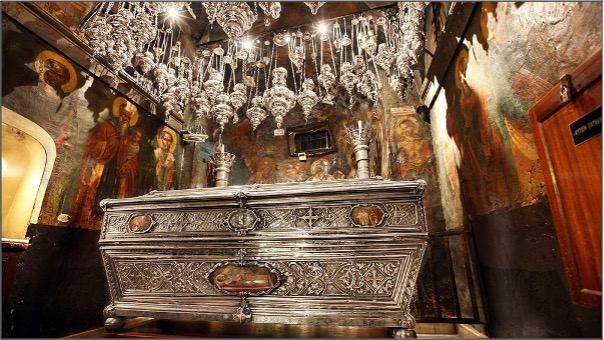
The sarcophagus holding the precious 1,700-year-old incorrupt relics of Saint Spyridon,
in the Saint Spyridon Church on the island of Corfu, Greece. He is called the “walking saint” because he wears out the slippers on his feet and they are replaced each year on his feast day.
Holy Father Spyridon pray to God for us!
A short synaxaria of Saint Spyridon
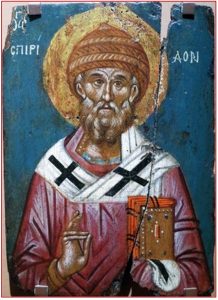 Born in Askeia, in Cyprus c. 270, Saint Spyridon was a shepherd. When his wife reposed, he and his daughter, Irene, both entered monasteries.
Born in Askeia, in Cyprus c. 270, Saint Spyridon was a shepherd. When his wife reposed, he and his daughter, Irene, both entered monasteries.
Because of his great piety, Spyridon was elected Bishop of Tremithous in the Larnaca district
of Cyprus. In 325, he attended the First Ecumenical Council of Nicaea where, by working a miracle, he boldly defended Orthodox theology against the Arians. He used a potsherd to metaphorically show how a single entity (the Trinity) could be composed of three separate entities. As the Saint completed his defense, the clay burst into flame in his hand, then dripped to the floor as water, leaving dust in his hand. Witnessing this miracle, a pagan philosopher was converted to Christianity. For this, the Saint is the patron of potters.
He worked many miracles during his life: bringing rain in a drought, casting out demons, healing the infirm, and raising people from the dead. While at the Nicaean Council, his daughter Irene reposed. Upon his return to Cyprus, a woman said she had given Irene jewelry for safekeeping but did not know where it was hidden. Spyridon went to Irene’s grave and asked her where the jewelry was hidden, and the girl spoke from the grave, so that the jewels could be returned to their owner. During a famine, the Saint changed a serpent into gold and gave it to a poor man so he could buy food for his family. Once in church celebrating vespers with only his deacon, people passed by and heard a beautiful choir singing. But upon entering, they found only the two of them and realized the angels were singing with them.
Following the Council of Nicaea, during the persecution of Emperor Maximinus, he fell into disfavor. But circa 348, Saint Spyridon reposed in peace.
When Cyprus was taken by the Arabs, the precious and incorrupt relics of Saint Spyridon were moved to Constantinople for safekeeping. In 1453, when the Ottomans overtook Constantinople, his relics were safely moved to Serbia, and then taken to the island of Corfu by a monk named Kalohairetis and placed in the Saint Spyridon Church on Corfu, where they remain to this day.
Over the centuries, he has worked many miracles. He is called the “Keeper of the City” for expelling the plague from the island of Corfu. In 1716, when the Turkish army and navy, under the leadership of Sultan Achmet III, laid siege to the city for 22 days, some of the Turkish soldiers saw Saint Spyridon threatening them with a lit torch and panic arose among the troops. The siege was lifted and credit was given not only to Count Schulenburg, who led the Venetian troops defending the island, but to Saint Spyridon. Vivaldi’s opera Juditha triumphans was commissioned to celebrate this victory.
Saint Spyridon is also patron of the Tolstoy family, dating back to the 15th century when Andrei Tolstoy selected the Saint. Relics of Saint Spyridon were given to Andrei by Grand Prince Basil II of Muscovy (1425-1462). To this day, this reliquary is held by the senior member of the Tolstoy family.
Saint Spyridon is commemorated by the Orthodox Church on December 12/25; the miracle against the Hagarenes on August 11/24; and also on Cheesefare Saturday.



